Donald Miller's Blog, page 107
March 22, 2012
Writing Tip: Treat the Word "That" Like a Cuss Word
If you're a decent writer, one tip that will take your writing over the top is to lose the word "that." I learned this from William Zennser in his book "On Writing Well."
 Instead of saying "I believe that we should…" try "I believe we should…" The word "that" makes the sentence weak. It loses some of it's punch and makes the writer sound apologetic.
Instead of saying "I believe that we should…" try "I believe we should…" The word "that" makes the sentence weak. It loses some of it's punch and makes the writer sound apologetic.
Go through your latest blog or chapter in a book and take out the word "that" as many times as you can. Treat it like a cuss word from now on, that is it's okay to use sometimes, but sparingly and only when it actually can't be removed.
Ridding your writing of the word "that" is much harder than you think. It seems to sneak into every piece I write. Often it's not until the third or fourth editorial pass I get rid of all the excess "that's." Sadly, even in this blog entry I had to delete a few. They're like cockroaches!
I hope that this tip helps your writing. Or better said, I hope this helps your writing.
Writing Tip: Treat the Word "That" Like a Cuss Word is a post from: Donald Miller's Blog
March 21, 2012
The Christian Movie Establishment vs. Blue Like Jazz
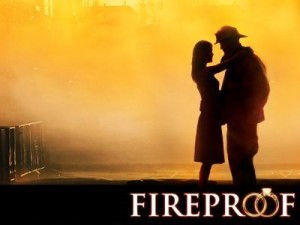 Steve Taylor, the director of Blue Like Jazz, posted this outstanding piece earlier today on the film's official Tumblr page. I figured it was worth reposting here.
Steve Taylor, the director of Blue Like Jazz, posted this outstanding piece earlier today on the film's official Tumblr page. I figured it was worth reposting here.
The website BoxOfficeMojo.com is full of useless statistics that I check regularly. One of its most fascinating and terrifying features happens when you click on "Genres."
Fascinating, because who knew that "Mother" was a genre (Mamma Mia!)? Or that The Matrix falls under the sub-genre "Action – Wire-Fu"?
Terrifying, because somebody will eventually be categorizing Blue Like Jazz inside a genre box. And it won't be me.
But the one box I don't want to occupy (besides "talking animal") is "Christian Movie."
Why should this be? The movie was written and directed by Christians. And it's based on a book with the subtitle "Non-religious thoughts on Christian spirituality."
But over the last five years or so, "Christian Movie" has calcified in the public consciousness into a genre where:
Sentimentality trumps substance
Good intentions trump artistry
All conflict must be tidily resolved
"Safe for the whole family" is a de facto requirement
Or as writer David McFadzean summarized, Christian movies are like porn – poorly lit, poorly acted and you always know how they're going to end.
I'm not saying this critique is always fair or justified. In the case of the best known movies in this genre – Facing The Giants, Fireproof, etc., by the Kendricks Brothers – I've given them props in the past for being good visual storytellers and actually getting movies made with the resources at hand. But they've also contributed to (and possibly cemented) the aforementioned stereotypes.
So maybe I should be flattered that, based on recent evidence, the Christian Movie Establishment they represent is out to get us.
Exhibit A: The Executive Pastor of Sherwood Baptist (where the Kendricks Brothers movies are produced) issued what amounts to a fatwa against Blue Like Jazz when he made it known that nobody who worked on our movie would be allowed to work with them in the future. (This strikes me as disingenuous at best coming from a church whose movies are distributed by Sony Home Entertainment, home of the The DaVinci Code. And, tellingly, the edict was issued before the movie had ever even been screened.)
Exhibit B: Provident Films, a co-distributor on each of the Kendricks Brothers movies, is also distributing a movie called October Baby next weekend. I have friends who acted in this movie, and while I haven't seen it, as a longtime pro-lifer I certainly support its message. So why would Provident's Vice President go to the extraordinary measure of attempting to get the Blue Like Jazz trailer banned from running in front of their movie? (This email was passed along to me, and I'm copying it unedited below.)
i think exhibitors are going to try to play the Blue Like Jazz trailer with october baby
this can not happen – the trailer actually has the words "I hate Jesus" in the voiceover along with a number of images that will be very offensive to catholics
it is in the best interest of theaters to not run the trailer because they are going to have a lot of angry patrons if they do
thanks for your help here
Apparently Provident Films have no qualms when it comes to lying about the content of our trailer ("I hate Jesus"???). And though I don't presume to speak for the Catholic community (unlike this Provident Films exec, who is also not a Catholic), I can tell you that the day I was forwarded this email, a Catholic nun who writes movie reviews for a Catholic publication told me after a Chicago screening that Blue Like Jazz was the best movie she'd seen in years, and that she'd be writing a glowingly positive review for her fellow Catholics. This follows other recent screenings where Catholic individuals and groups in attendance have been equally enthusiastic.
So what is it about Blue Like Jazz that the Christian Movie Establishment finds so threatening?
I've now sat in on over one hundred screenings of Blue Like Jazz, and I'm convinced that the reason it's resonating so strongly with audiences across the country is because, like the book it's based on, it reminds us of our own experiences. Don's original story certainly resonated with me – I was a youth pastor at a Baptist church in Denver at the time I was attending the University of Colorado in Boulder. I wanted to make Blue Like Jazz because I felt I'd already lived it. Are there certain stories that we're not allowed to tell, even if they're not "safe for the whole family"? Wouldn't the Bible be a much shorter book if we edited out the parts that weren't family-friendly?
I recently spoke with one of our Kickstarter backers, and he was telling me how exciting it was to watch the "Save Blue Like Jazz" Kickstarter campaign turn into something historic.
He told me, "It seemed like it was even bigger than just this movie. It was a movement of a new generation of Christians who want to see us making better art. It seems like the Christian Media industry has become all about replicating culture. But we want to be creating culture."
As Christians working in the creative arts, our job, first and foremost, is to tell the truth. Jesus himself said, "You shall know the truth, and the truth shall set you free."
One of the most consistent criticisms I got as a recording artist came from fellow Christians saying, "Why do you do these songs criticizing the church? Why would you go airing our dirty laundry for the public to see?" And, of course, that same criticism had been leveled at Blue Like Jazz.
This perspective has always amused me, as if the public thinks we've got our act together perfectly, as if they don't already see the hypocrisy in our midst. They just think we're too dumb to see it ourselves.
Which is why the image of a guy in a confession booth finally confessing the truth started my six-year-long quest to make Blue Like Jazz.
When we tell the truth – even the uncomfortable truth – the truth sets people free.
I'm glad movies like Fireproof exist, and I wish its makers continued success. But most of my movie-going friends are ready for a different representation of their faith beyond what the Christian Movie Establishment is currently serving.
If you're one of them, I hope you'll cast your vote on April 13th.
The Christian Movie Establishment vs. Blue Like Jazz is a post from: Donald Miller's Blog
March 20, 2012
Do You Have an Undiscovered Inner Genius? What I Learned From Sir Ken Robinson
Last year I happened to run into Sir Ken Robinson in a bar in the Caribbean. I was speaking at a small conference, taking a break and suffering in the warm sun on a perfect beach (this rarely happens in my life. I live in Portland, Oregon remember. I deserved this) It began to rain and a few of us ran for shelter in the beach-side bar where I struck up a conversation with a fascinating, distinguished woman who lived in L.A. She was a novelists and was wrapping up another book and we talked about our writing process.
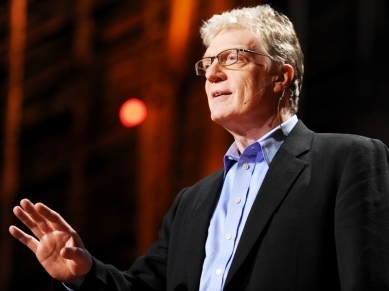 An hour or more later, her husband joined us and a couple hours after that I realized I was having drinks with Sir Ken Robinson and his wife, more proof that I am the Forest Gump of spiritual writers.
An hour or more later, her husband joined us and a couple hours after that I realized I was having drinks with Sir Ken Robinson and his wife, more proof that I am the Forest Gump of spiritual writers.
For those of you who don't know who Ken Robinson is, he is attempting to reform the education system in the west. And he is as bright and witty in person as he is in his TED Talks (He's the most watched TED speaker of all time) and has twice the charm. In fact, he's so fascinated with people it was difficult to get him to stop asking me questions and to talk about his work.
Sir Robinson's book is called The Element and it's about finding your passion, finding that thing that fuels your creativity and drives your engagement. He believes our current education system was designed to produce workers for the industrial revolution and is ill equipped to help people find and cultivate their inner genius. He is well stocked with examples of dancers, painters, singers and novelists who nearly failed out of school and yet went on to create works of genius. He also believes most of us have a genius we haven't discovered and may never discover without some help.
I knew even as we were talking I'd found my element in life. I like to write, make movies, and help people find their passions and organize their creative and personal lives.
Ken believes that each of us have an element, as in "she's really in her element when she's interacting with clients in the field" and when we find it, our work is fueled by our inner passion.
You can watch Ken's TED Talk below, or pick up his book here (non-sponsored link.) I do hope you find your element. There's nothing like waking up and doing what you love. It may take some sacrifice, but it's worth it.
Some question that might help you discover your element are:
What do you spend your time daydreaming about?
What's a project you've worked on in which you lost track of time because you were so consumed by the work?
If money weren't a hindrance, what work would you do?
Do you believe you have an inner genius? Do you believe the education you received helped you tap into that genius? What would it take to move you over to a field of work that would most align with your passions?
* If you'd like to join the thousands who are finding their passions in their work and lives, consider registering for a Storyline Conference today. To find out more, click here.
Do You Have an Undiscovered Inner Genius? What I Learned From Sir Ken Robinson is a post from: Donald Miller's Blog
March 19, 2012
It's the Journey that Makes Coming Home Sweet, a Guest Blog from Bob Goff
Today's guest post is from my old friend Bob Goff. Bob has a book coming out next month called Love Does and you can pre-order it here. Here's an excerpt:
 Ever since I was a kid I wanted to sail across the Pacific Ocean to Hawaii. Every other year, there's a race from Los Angeles to Hawaii – it's called the Transpac Race. For safety reasons, the rules require that competing boats be forty-five feet or longer with a full crew. But on this particular year, they changed the rules to allow smaller boats to go, so a couple buddies and I signed up to enter the race in a thirty-five-foot sailboat.
Ever since I was a kid I wanted to sail across the Pacific Ocean to Hawaii. Every other year, there's a race from Los Angeles to Hawaii – it's called the Transpac Race. For safety reasons, the rules require that competing boats be forty-five feet or longer with a full crew. But on this particular year, they changed the rules to allow smaller boats to go, so a couple buddies and I signed up to enter the race in a thirty-five-foot sailboat.
Now, thirty-five feet doesn't sound that small at first, until you figure out that it's about twice the length of a Toyota Camry and a little narrower. After you subtract the pointy end, it's about the size of a 1960s VW bus filled with twenty-five huge bags of sails, a life raft, six cases of Stagg chili, six hundred bottles of water, five guys, and a porta-potty. Come to think of it, that's what a lot of 1960s VW buses still look like inside.
The plan was simple. We'd sail twenty-six-hundred miles across the ocean in our VW bus at seven miles an hour while God threw three garbage cans full of ice-cold water in the windows every couple of minutes; and while all this happened, we'd just eat chili and tell manly stories about ourselves. It took a while to get there, but we made it a couple weeks later.
There's a tradition in the Transpac Race no matter when you finish the race, even if it's two in the morning. When you pull into the Ala Moana Marina in Oahu, there's a guy who announces the name of the boat and every crew member who made the trip. There's a huge loudspeaker and his booming voice bursts through the trade winds and welcomes each person home. It's the same guy, and he's been announcing each boat's arrival at the end of every Transpac Race for decades.

I'll spare you most of the details of the trip. Just know it involved a lot of water, some stinky dudes, overblown stories of manhood, and lots of canned meats and chili. Just when we came to the end of our supplies, we sailed across the finish line just off Diamond Head and into the marina. It was a few hours before dawn. It had been sixteen days since we set out from Los Angeles in our little boat knowing very little about navigation. Suddenly, the silence was broken by a booming voice over a loudspeaker announcing the name of our tiny boat. Somehow the way he said it, we sounded like we were the size of an aircraft carrier. Then he started announcing the names of our ragtag crew like he was introducing heads of state. One by one he announced all of our names with obvious pride in his voice, and it became a really emotional moment for each of us onboard.
When he came to my name, he didn't talk about how few navigation skills I had or the zigzag course I'd led us in to get there. He didn't tell everyone I didn't even know which way north was or about all my other mess-ups. Instead, he just welcomed me in from the adventure like a proud father would. When he was done, there was a pause and then in a sincere voice his last words to the entire crew were these: "Friends, it's been a long trip. Welcome home." Because of the way he said it, we all welled up and fought back tears. I wiped my eyes as I reflected in that moment about all the uncertainty that had come with the journey, all the sloppy sailing and how little I knew. But none of that mattered now because we had completed the race.
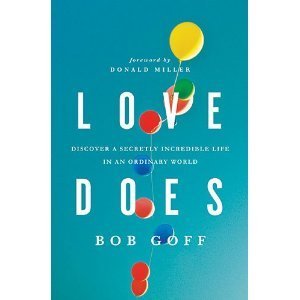 I've always kind of thought that heaven might be kind of a similar experience. I read somewhere in the Bible that there is a book of life. I don't think that this book of life is full of equations, and I don't think that it's just a list of names either. I think that this book of life is more like a book of lives, a book of stories. I bet it's about people traveling in the direction of Jesus, trying to follow Him. People like me who made lots of mistakes and midcourse corrections. It's about people who stayed within the large circle of His love and grace, staying the course on a long line pointing toward Him. And their names weren't in the book because of what they did or didn't do. They were in there because of who God is and what He has done to draw a circle around them.
I've always kind of thought that heaven might be kind of a similar experience. I read somewhere in the Bible that there is a book of life. I don't think that this book of life is full of equations, and I don't think that it's just a list of names either. I think that this book of life is more like a book of lives, a book of stories. I bet it's about people traveling in the direction of Jesus, trying to follow Him. People like me who made lots of mistakes and midcourse corrections. It's about people who stayed within the large circle of His love and grace, staying the course on a long line pointing toward Him. And their names weren't in the book because of what they did or didn't do. They were in there because of who God is and what He has done to draw a circle around them.
After we each cross the finish line in our lives, I imagine it like floating into the Hawaiian marina when our names were announced, one by one. And at the end, perhaps simple words spoken by a loving and proud God will be, "Friends, it's been a long trip. Welcome home."
Bob Goff will be joining us on stage at the Storyline Conference in Nashville and Portland. Register today.
It's the Journey that Makes Coming Home Sweet, a Guest Blog from Bob Goff is a post from: Donald Miller's Blog
March 16, 2012
Regarding the News About Jason Russell of Invisible Children
There aren't many things harder in life than dealing with fame. And dealing with sudden, explosive fame is harder than anything most of us can imagine. The news about Jason Russell is unfortunate.
What he and the organization needs is compassion. This can either be the worse thing that has happened to them or work out fine. Here are a few suggestions.
1. Don't gossip. Whatever you hear doesn't really matter. Lets just not spread anything.
2. Admit this is an unfortunate situation but also that people are human and flawed and we all have our crap. It would be a mistake to demonize anybody.
3. Pray that those who need help get help.
4. Move on. Don't dwell on this story because this story is a distraction. Keep working for great causes.
God works in the world the way crops are grown. He works slowly, with teams of people, quietly and through relationships. For all of us hoping for an explosive, sudden jolt, just know it isn't natural and it jacks with your mind. Keep working, daily, digging our rows and harvesting our crops. Play your small part in the grand epic. Keep your head down, and don't enjoy anybody else's mistakes.
Much love to all those who have supported Invisible Children. You've done and will continue to do good work. Keep your chin up.
Regarding the News About Jason Russell of Invisible Children is a post from: Donald Miller's Blog
What to do When You Put Your Foot in Your Mouth
Last week on this tour promoting the film, I put my foot in my mouth. Somebody asked why I'd not seen the most recent Christian film and I answered because I wasn't a "jack ass." Though it got a laugh from the audience, it was a dumb thing to say for several reasons. The first is it wasn't a sophisticated answer to the question, the second is that it was offensive, and the third is because I actually hadn't seen the film.
 As a writer, I've often been tempted to disassociate from some forms of Christian literature. Fortunately, my faith tradition has hundreds if not thousands of literary figures I'm proud to be associated with, but within popular culture we are best known for a very few. Some of these books are cheesy, self-help kinds of books. Sort of message-of-the-moment books.
As a writer, I've often been tempted to disassociate from some forms of Christian literature. Fortunately, my faith tradition has hundreds if not thousands of literary figures I'm proud to be associated with, but within popular culture we are best known for a very few. Some of these books are cheesy, self-help kinds of books. Sort of message-of-the-moment books.
I shouldn't worry about any of that, but I do. I care about what people think about me. Chalk it up to the fall of man.
Now that we are releasing a Christian film, the most frequent question we get asked by the press is about why we would want to enter into a genre that is so critically panned. My comment the other day went too far in distancing myself from that genre. To be sure, their camp has done the same thing. Steve will be releasing a statement soon about this. Nevertheless, when you stick your foot in your mouth, you must admit guilt.
I'll start by apologizing. There's a small sub culture within evangelicalism who likes those movies. I hate the fact that the entirety of evangelicalism is artistically represented in the theater by these films, but nevertheless, some people like them. They have a right to like those movies, and whether they or good or not is subjective. Not only this, I have plenty of friends who I admire who like these movies, and I've heard the people who make these movies are good storytellers. Not only this, but making movies is hard, and these guys get it done again and again. It was disrespectful of me to disrespect them.
This won't be the last time I put my foot in my mouth. I don't like it when people speak through press releases. I can't connect with those people. I want to know what somebody really thinks and feels. I prefer the true answer to the right answer. So this will happen again. Hopefully, though, it will happen less and I'll use more wisdom.
When I put my foot in my mouth, though, I've got a little checklist I go through. Here it is in case you need it:
1. Move fast. Don't let anything get out of hand.
2. Admit guilt.
3. Explain the circumstances without making excuses.
4. Apologize if somebody was wrongfully offended.
5. Learn from the mistake and get better without becoming a politician.
6. Thank people for their kindness and forgiveness.
7. Get back to work.
Thanks for the grace.
Best,
Don
What to do When You Put Your Foot in Your Mouth is a post from: Donald Miller's Blog
Who is Directing Your Story? Why Having a Higher Power Matters

Steve Taylor, Myself and Marshall Allman at the SXSW Film Festival
This month I've been traveling with Steve Taylor who directed Blue Like Jazz. Steve is the engine behind the movie and has been from the beginning. I'd even say Steve was the principle writer.
On set, Steve displayed the best example of leadership I'd seen to date. He was strong on task, but open to everybody's ideas. Even while filming ten to twelve hour days, he took time at night to write thank-you cards to crew. I learned that from one of the ladies in the make-up truck.
I learned a lot about leadership from Steve. I learned you can't railroad your way but you can lead with a vision, hard work and a lot of kindness. Steve also taught me something about life while we were filming the movie. He taught me that we all need a director, somebody to call the shots and to remind us about the overall arch of our story.
Movies aren't shot in the order of scenes in the screenplay. You may be shooting the first scene of the screenplay followed by the last, all in a day. This means actors had to know the script inside and out to understand where their character was in the development of the story.
Actors have to know their parts, but Steve had to know everybody's part. To this day, Steve has the entire script memorized.
Often, while filming, Steve would pull an actor aside and remind them of what had just happened in the story, whether it was to influence a wardrobe change or to help the character understand how sad they were supposed to be.
In life, we need somebody to help us understand the big picture of not only our story, but the story of all of humanity. For me, that somebody is God. I was asked recently who my higher power was and I told the person my higher power was Jesus. And in a way, Jesus acts in my life the way Steve acted on set. Jesus reminds me the story isn't about me, and other characters matter, and He reminds life is short and matters of the heart trump all. He helps me understand what my motivation should be and about what's gone on in my past.
I am convinced life-stories void of a director are disasters waiting to happen. There is no way we can get all of life crammed into our little heads. We need somebody who has the whole script memorized, not just our parts, but the whole of the epic narrative.
Who is your higher power, and how does your relationship with that power influence your daily life?
Who is Directing Your Story? Why Having a Higher Power Matters is a post from: Donald Miller's Blog
March 15, 2012
Come Join the Storyline Community!
Storyline is a growing community of people who have, together, created their life plans and are attempting to live a better story. Here are five reasons you should register for Storyline today!
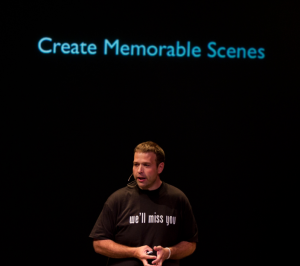 • BE INSPIRED: Storyline may be that shift you need to realize life is worth living. Sometimes a single story or anecdote can make all the difference and at Storyline you'll get six hours of me and my friends helping you understand why life is a gift and not a burden.
• BE INSPIRED: Storyline may be that shift you need to realize life is worth living. Sometimes a single story or anecdote can make all the difference and at Storyline you'll get six hours of me and my friends helping you understand why life is a gift and not a burden.
• IT'S TIME WE MEET IN PERSON: I only speak a few times a year (Portland is pretty far away) and so Storyline will give us some time in a smaller environment to interact. There will be plenty of time for Q and A and I'll be hanging around after each talk. Lets connect.
 • CONNECT WITH OTHERS: Storyline attracts people who want to truly live life, not just get through it. And untold friendships have blossomed between Storyline attendees reaching out and sharing the highs and lows of their lives. The newly designed conference will provide even more space and time to connect. Come join us and meet your newest, most inspiring friends.
• CONNECT WITH OTHERS: Storyline attracts people who want to truly live life, not just get through it. And untold friendships have blossomed between Storyline attendees reaching out and sharing the highs and lows of their lives. The newly designed conference will provide even more space and time to connect. Come join us and meet your newest, most inspiring friends.
• RECONNECT WITH GOD: Storyline brings people together of all faiths and denominations. As a Christian, I'll speak of the God of the Bible, but without the trappings of religion and self-help dogma, your cynicism radar will calm down and you'll be able to think about God ina new and refreshing way.
• LEAVE WITH A NEW VISION FOR YOUR LIFE: Storyline is all about moving into your dreams and making things happen. By the time you leave, you'll have begun to create your Storyline, which is a life plan that uses the elements of story to make sure you live a meaningful life. If you've lacked clarity or focus, or need practical guidance to get going, Storyline is for you.
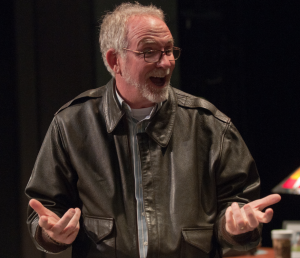 • AND THERE'S MORE: At our Portland and Nashville conference, Bob Goff will be joining us. Bob is the guy I wrote about in A Million Miles in a Thousand Years and has his own book coming out on May 1st. Pick up Love Does today and come on out and meet Bob. For our Westmont Conference, we are bringing a few surprise guests who will inspire you to live a better story and amaze you with what they're doing in the world. Come join us today. Make this year the best one yet.
• AND THERE'S MORE: At our Portland and Nashville conference, Bob Goff will be joining us. Bob is the guy I wrote about in A Million Miles in a Thousand Years and has his own book coming out on May 1st. Pick up Love Does today and come on out and meet Bob. For our Westmont Conference, we are bringing a few surprise guests who will inspire you to live a better story and amaze you with what they're doing in the world. Come join us today. Make this year the best one yet.
Sincerely,
Don
Registration deadlines are fast approaching on our three Storyline Conferences. You can register for Portland, Nashville or Santa Barbara by clicking here.
Come Join the Storyline Community! is a post from: Donald Miller's Blog
March 13, 2012
One Person, Who Believes They Have Agency, Can Change the World.
Last year I interviewed Pete Carroll, head coach of the Seattle Seahawks. We spent two hours in his Seattle office, talking about leadership, humility, success, family, spirituality, politics and everything else save the one topic he speaks of so often, football.
 I interviewed Coach Carroll to learn more about the work he started with inner-city, at-risk kids while he was coaching the USC Trojans in LA. Several years ago Coach Carroll started a program called "A Better L.A." providing opportunities for under-privileged kids in the inner city. He has since duplicated that program in Seattle.
I interviewed Coach Carroll to learn more about the work he started with inner-city, at-risk kids while he was coaching the USC Trojans in LA. Several years ago Coach Carroll started a program called "A Better L.A." providing opportunities for under-privileged kids in the inner city. He has since duplicated that program in Seattle.
Coach Carroll started the program after driving to work at USC one morning and hearing a report about gun violence between gang members in a nearby neighborhood. The next day he learned of another killing and by the end of the week eleven gang members were dead.
Most of us would have heard similar reports and felt bad for the kids and their families, but we wouldn't have associated ourselves with a solution. Perhaps if we were social workers we'd know a theory or a program, but Coach wasn't a social worker. He was running the most successful college football operation in the country.
And here is where Coach Carroll differs from most of us. Coach didn't start a committee to research the issue or read a book or call around looking for information. Instead, he got into his car, drove into the neighborhood where the violence occurred and befriended gang members. He helped their mothers carry in groceries, played basketball with them on the courts and invited them to come watch the USC football practices.
I'd known all this before interviewing Coach Carroll, so my question going in was why? Why did you assume you could be a solution? And why did you care?
The answer was two-fold, and someday I'll release the book detailing this and many more interviews. But for now, I'll give you the top two things I learned about not only Pete Carroll but about you and me, too.
Here they are:
 He believed before we help others we needed to get over ourselves. I asked coach why he cared about those kids, and he struggled to answer. He wasn't sure, really. He just did and he didn't understand why anybody else wouldn't. I pointed out that most people are too busy dealing with their own lives and their own stories to care about anybody else.
He believed before we help others we needed to get over ourselves. I asked coach why he cared about those kids, and he struggled to answer. He wasn't sure, really. He just did and he didn't understand why anybody else wouldn't. I pointed out that most people are too busy dealing with their own lives and their own stories to care about anybody else.
I wondered if Pete Carroll weren't some kind of exceptional humanitarian or something. But Coach set me straight. He said early on he was consumed with winning, and to some degree he still is (though he cares more about helping other people win than himself, another key to his success as a leader) but after achieving success at an early age, he found the experiences somewhat empty. He got over himself (my words, not his) and realized he was much more fulfilled leading teams of people toward success, whether in football or life. It wasn't enough to win on his own, he wanted to win with people he cared about.
Secondly, he believed we had the power to change the world. Like few people I've met (although I've met a few including Bob Goff and Tom Ritchey) Coach Carroll believed he was the solution to a problem. He wasn't an expert on the inner city or on gang violence, but he knew he was intelligent and physically capable to go in and figure it out. He took action, he moved, he went to them and listened and made a massive contribution to the well being of others.
I can't stress enough what a massive paradigm shift this is for most people. As we argue about who has the solution to many of life's problems, few of us understand the absolute truth that we are the solution. If somebody is hungry, we can feed them. If somebody lacks education, we can teach them. If somebody is lonely, we can befriend them. There was no part of Pete Carroll's personality that didn't believe he could be a solution to the problems around him. If that doesn't define a leader, I don't know what does.
After meeting with Coach Carroll and reading his book Win Forever, I've had a paradigm shift. I've stopped complaining about whose solution is better, I've stopped letting my social action get bogged down in talks about theory. If there's a problem, I ask what I can do, not what should be done.
What problems around you could you solve? What hurts in the world could you contribute a solution to? And what scares you about taking action?
* If you're wondering what your purpose in life is, consider registering for a Storyline Conference. You can learn more about Storyline here.
One Person, Who Believes They Have Agency, Can Change the World. is a post from: Donald Miller's Blog
March 12, 2012
Is Sarcasm Killing Your Relationships? Try This 48-Hour Challenge.
Sarcasm may have it's occasional place, but people who are too often sarcastic are protecting themselves.
 Not long ago I was talking with an older, wiser friend and when she asked me a difficult question, I made a joke. My friend laughed but then noted I often made jokes when it would be more appropriate and healthy to connect. She said I was definitely funny but she'd rater know the real me than to watch me hide. Ouch.
Not long ago I was talking with an older, wiser friend and when she asked me a difficult question, I made a joke. My friend laughed but then noted I often made jokes when it would be more appropriate and healthy to connect. She said I was definitely funny but she'd rater know the real me than to watch me hide. Ouch.
The truth is she was right. I was hiding. Sarcasm and joking around are great in moderation, but often what hides behind the cynical exterior is a heart that's been hurt (if that last line made you search for a sarcastic comeback or a joke, you're likely the person I'm talking to.)
So here's a little experiment for you. If you're the type to joke around a bit too much, take a break for the next 48 hours. When you're tempted to tell a joke, don't. Instead, move toward the people you are with. Ask them serious questions about their work, their relationships, their dreams. Connect on a real level rather than trying to entertain.
Your heart will thank you.
* If you'd like to know more about relationships, consider registering for the Storyline Conference. One of the modules in the Storyline process is all about relationships. Learn more by clicking here.
Is Sarcasm Killing Your Relationships? Try This 48-Hour Challenge. is a post from: Donald Miller's Blog
Donald Miller's Blog
- Donald Miller's profile
- 2745 followers



